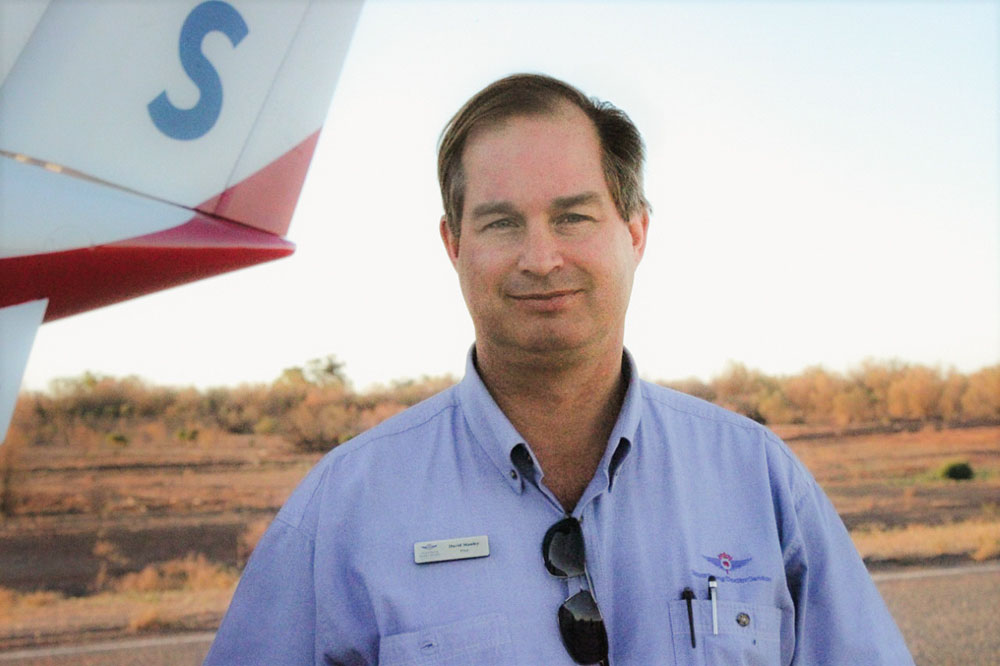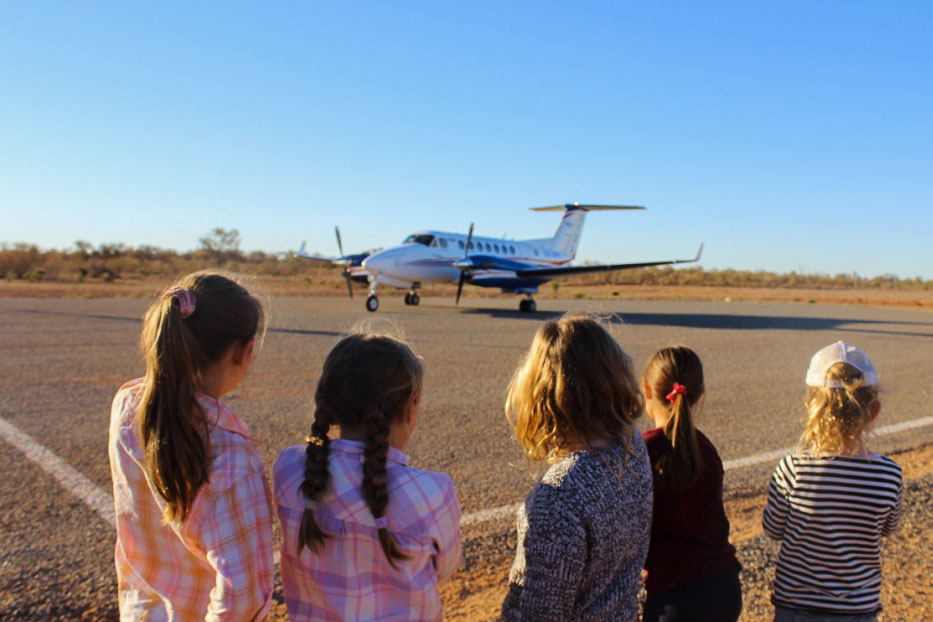This Community Spotlight Feature was written and produced
by Scott Cooper with
King Air Nation, and shared with Textron Aviation.
One of the greatest goals we will strive for in life is
finding meaningful purpose; a purpose that serves a greater
good.
We recently came across an individual, David Stanley, a
Beechcraft® King Air® pilot, who has found that
purpose in serving with an organization that has an incredibly
altruistic goal; the Royal Flying Doctor Service (RFDS) of
Australia. In addition to being a pilot, David is also a
talented photographer. We reached out to him to learn more
about his experiences with the RFDS, to showcase his
photography, and to hear how the King Air's versatility excels
in Australia.

David Stanley, King Air Pilot with the Royal Flying Doctor
Service of Australia (Image: RFDS)
David was born in Brisbane, Queensland and then would grow up
in New South Wales (NSW). His early aviation career was spent
over seas, flying in the Caribbean. During this time, he would
learn about the aeromedical sector and first begin flying King
Air®.
"I first became exposed to aeromedical flying between 2000 and
2006, when I was based in the Turks & Caicos Islands (585
nautical miles South East of Miami). I did a few flights to
Nassau, Bahamas carrying hospital patients and enjoyed seeing
the instant benefit of emergency care for my patient."
That joy of helping others would propel David to continue
aeromedical King Air® flying. Upon returning to Australia he
would join the RFDS.
"I'm presently based in Dubbo, NSW which is 400 kilometres
west of Sydney," David noted, "I spent 12 years in Sydney
flying for NSW Air Ambulance/RFDS covering the states of NSW,
Queensland, Victoria and Tasmania, transporting patients to a
variety of different tertiary medical care hospitals. Access
to quality and safe medical care is difficult for people in
the bush, and we go to where we are most needed."
Travel is constant for David. In addition to patients, he also
transports primary health clinicians, GPs, dentists and mental
health clinicians to remote clinics around Far West and
Western NSW.
"With a 'waiting room' as large as ours, we also need to ferry
our King Airs to different bases - Dubbo, Broken Hill and
Bankstown, depending on where there is the most demand," said
David, "I usually spend a week or so at a different base every
month, getting to know my colleagues."
RFDS pilots are rigorously trained to meet the many
difficulties of being an air ambulance pilot. David explained:
"Pilots at the RFDS are regulated in the same way commercial
pilots are. We regularly train and go through an annual
assessment using our state-of-the-art simulator in Dubbo."
"I did a St John's medical First Aid certificate, followed by
induction training with the RFDS involving Doctors, Flight
Nurses and Pilots. I also complete an emergency training
course every 12 months covering aspects of life rafts,
survival ditching and aircraft safety equipment."
David then noted something that resonated the importance of
that training:
"When you're out in a remote location during an emergency,
you're not just a pilot. You're another pair of hands that
could help save a life."David Staney
Australia is a vast continent. It spans over 7.69 million
square kilometers (over 2.96 million square miles), making it
the world's sixth largest country by total area. The majority
of Australians live in major cities, which only comprise of
0.3% of Australia's land mass. Of Australia's estimated
resident population of 25.6 million (in June 2021), just over
seven million live in rural and remote Australia. Around half
a million live in remote or very remote Australia.
David further explained the severity of the remoteness and how
the King Air®'s strengths help reach those areas:
"Some people living in the rural communities we support can
drive for 6 or 7 hours before getting to their regional town.
We land on dirt strips maintained by the local community just
as often as we land at regional airports. Isolation and
temperature changes during summer and winter can affect fuel
loads, plus thunderstorm activity in summer - particularly in
northern parts of Australia can be hazardous. With the King
Air being fast, robust, dependable, pressurized, air
conditioned and able to land on short runways, the RFDS
considers it to be the perfect machine for our needs."
King Air® models that David currently flies includes the
B200, B350, and the B350 CHW.
"These models are very nice to hand fly, operate long
distance, deviate around weather, and pick up multiple
patients in single mission," he noted. "Plus, the Fusion
cockpit upgrade has been awesome in terms of displaying more
information and giving me what I need to know for safe,
efficient flying."
David has had many unique King Air® flying experiences
including some humorous ferry flights during his overseas
time:
"I completed two long distance ferry flights from Australia to
the Caribbean in a King Air B200 that had an added internal
fuel tank giving a 20-hour endurance. Flying from Hawaii to
Los Angeles in 12 hours was memorable."
It was during the next section, Los Angeles to Providenciales
(Turks & Caicos), approximately a 3000nm trip, that U.S. air
traffic controllers began questioning the aircraft type.
"They asked "Can you confirm you're a King Air?" several
times," David laughed.
Australia features stunning landscapes that host breathtaking
sunsets and sunrises. The vastness of the remoteness allows
for sights unspoiled by city lights. David noted to us how he
has taken hundreds of photos of the beauty of the country.
Even the color scheme of the RFDS King Air® aircraft itself
reflects it. David explained:
"Our new aircraft livery, features a red belly (representing
the earth) and a blue tail (the sky). It is eye catching for
other pilots as well. I love to show off my plane, I'm very
proud to be a RFDS pilot."
The RFDS has had robust support from the many remote
communities of Australia. These communities will undergo
training to understand RFDS operations (such as an emergency
landing) so that they might assist in a voluntary capacity, if
required. A training event at an exceptionally remote town
(733 kilometers/400 miles, 8-hour drive from nearest capital
city, Adelaide) called Packsaddle in Far West NSW became one
of David's proudest moments.
Packsaddle locals gathered at the nearby Shannon's Creek
Emergency Airstrip, where David landed one of the new RFDS
King Air® aircraft. Unique about the airstrip is that it
serves as an operational highway normally. The demonstration
included practicing how shutting down the highway would take
place in order to allow for an emergency landing.
"It was a really significant day because it was a whole team
effort and took a lot of preparation, where we worked closely
with local emergency services to ensure it all ran smoothly,"
David said. "It was very special to have the local community
come together that day, which was all about ensuring they have
easier access to emergency healthcare."

Local Packsaddle children view the RFDS King Air®
David's work truly embodies the motto of the RFDS: "Provide
the finest care to the furthest corner." He hasn't achieved
this goal alone; but with the overwhelming support of his
colleagues, the numerous communities of Australia, and one of
the greatest aircraft ever constructed, the Beechcraft® King
Air®.
"Working for the RFDS which is a national icon gives me a huge
sense of pride," David said. "I enjoy the sense of mateship
with my fellow team, which includes the Doctors, Flight
Nurses, Engineers and our Operations department. I first flew
the King Air in 2003 and am now celebrating 20 years of
dependable comfort and service."
We hope for many more incredible flight years to come for
David.
Special note from the RFDS:
This year, the RFDS celebrated its 95th anniversary,
commemorating its long-standing commitment to provide
essential healthcare and emergency aeromedical services to the
Australian community. In 2028, the Flying Doctor RFDS will
celebrate a centenary of operation. We couldn't deliver on our
promise to deliver the finest care to the furthest corner
without our amazing fleet of King Air® aircraft.
Learn more about the RFDS on the
company website.
You can follow David Stanley on his
LinkedIn account
and his
Instagram account @rfdsflier.
Author: Scott Cooper, King Air Nation Communication
Specialist
Info/Photos: (unless noted otherwise): David Stanley,
Pilot, RFDS
Additional Support/Info: Taylor Jurd, Brand and
Communications Advisor, Royal Flying Doctor Service, South
Eastern Section
Videos and stories contained in this site may contain information that while accurate at the time of publication, has since been updated. Please connect with a representative for any questions.